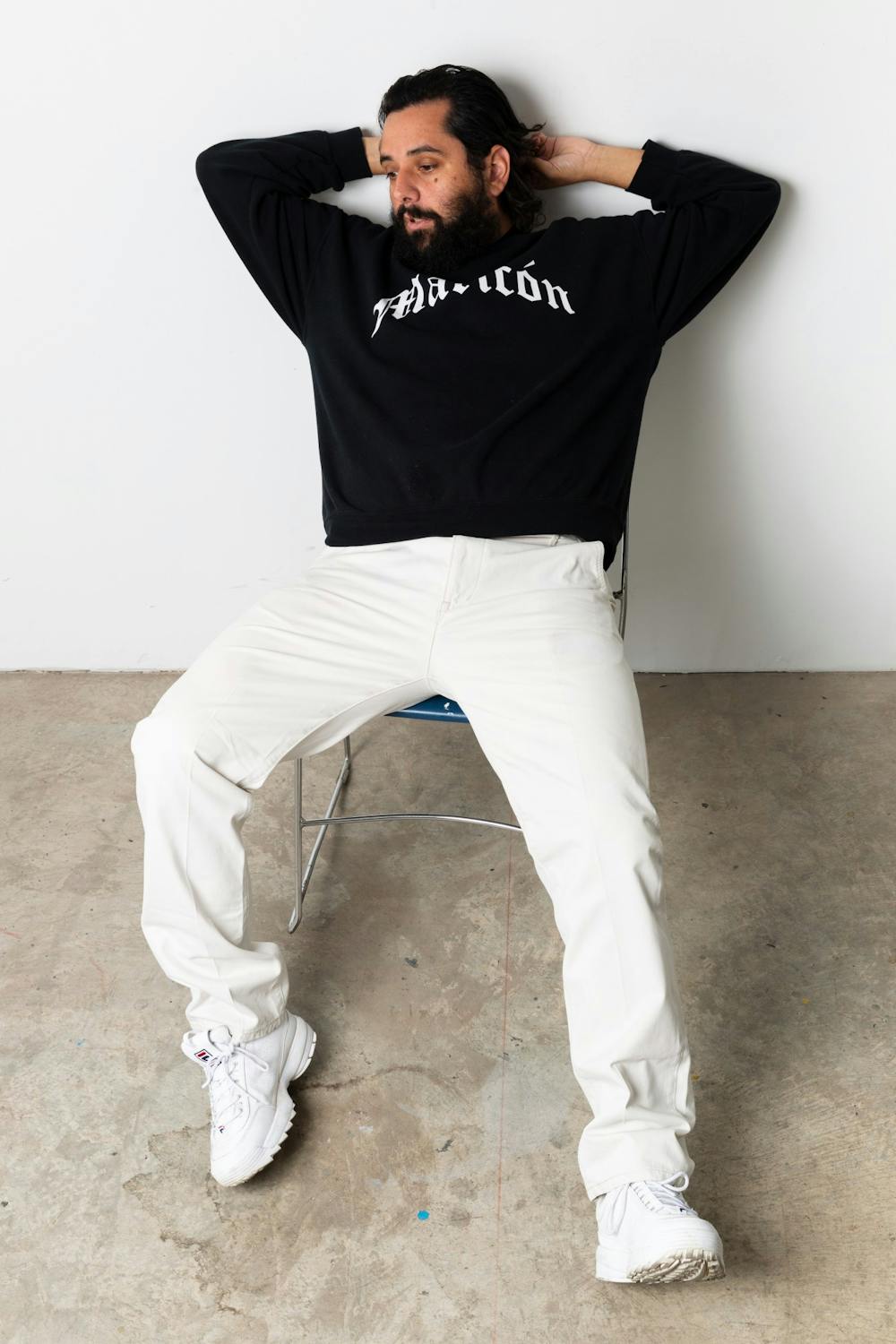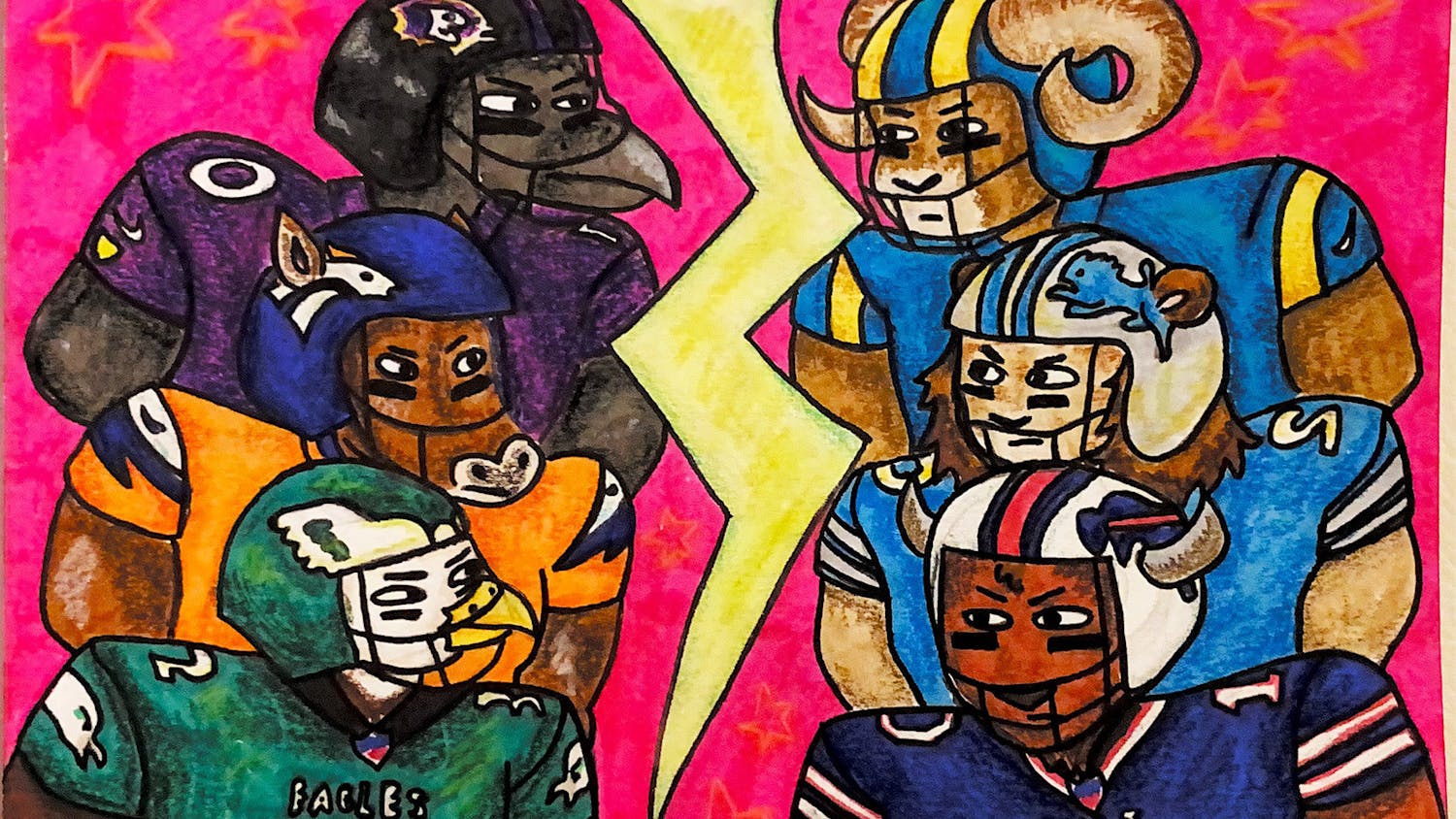Mark McKnight is an artist and assistant professor of photography at the University of New Mexico. Working primarily in black-and-white analog photography, the works showcased on McKnight’s portfolio website depict jagged desert landscapes, nude figures, sex acts and cloud-spotted skies.
“Landscape, body, transcendence, or even the spiritual, the erotic, my identity — I’m brown, Nuevomexicano, but also mixed-race, so I have a complicated relationship to identity — if I had to sum it up with one word, it would be the subjective,” McKnight said, describing the concepts his photography portrays.
“As a being in the world, I can only speak for myself. My work is a reflection of my subjectivity, which is, I think, what it is for everyone,” McKnight said.
Such work garnered McKnight Aperture’s 2019 Portfolio Prize. The publication noted that in his work, “the body, the physical world and the built environment begin to merge” and that McKnight’s stark portrayal of nude male figures challenged Eurocentric beauty standards and made “straight photography a little less straight.”
McKnight was born in Los Angeles, and his mother was the only child in her family to be born outside of New Mexico. As such, McKnight has a long family relationship with the state, a connection he says deeply influences his work.
“I don’t know a ton about my family history because my grandfather, as I think many men of a certain generation from New Mexico did, for a variety of reasons, suffer from alcoholism,” McKnight said, explaining that his grandfather severed ties from his family and fled to Los Angeles as a young man in an attempt to flee prosecution for a crime. This intergenerational trauma tied to New Mexico is another subject McKnight said his work covers.
McKnight’s introduction to photography as an art form was almost by accident.
“There was an arts requirement in the public school I went to, and I didn’t think of myself as much of an artist. I wasn’t from an ‘arty’ family, and I took photography I think because it seemed like the medium that required the least artistic skill,” McKnight said with a laugh. “And then I ended up falling in love with it.”
This love grew as McKnight continued his work, eventually utilizing photography as his primary artistic medium.
“I love all mediums but there’s something (magical) about photography. I love images that are at least, at times, slightly surreal, and I think photography’s a great medium for manufacturing other worlds, but also producing images that feel very believable,” McKnight said. “I like photography because I can walk that line. Photography’s where I’m most at home.”
Though McKnight says he doesn’t privilege any methods of photography over others, he described a special affinity for analog, or film photography.
“I think one of the things that I really grew to appreciate is that the darkroom, and working with film — it really forces me to slow down. I think we live in an increasingly very fast world that privileges convenience, and in a world that is image-saturated. I really love meditating over the subject under a dark cloth,” McKnight said, referencing the piece of light-proof material a photographer might use to cover their head and a large format view camera when photographing.
Get content from The Daily Lobo delivered to your inbox
“I love being in the darkroom and reflecting … as latent images materialize on silver (halide) paper, and thinking about what drew me to the subjects I photograph,” McKnight said.
Considering his long-standing familial, personal and artistic relationship with New Mexico, McKnight said he was elated when an opening for a position as associate professor in UNM’s photography department came up.
“I had long been a fan of many of the alumni of the program. It has long had a significant and important reputation and plays, I think, an integral role in the history of photography in the United States,” McKnight said. “When the position opened up it felt like a dream come true, and in some ways I felt like there was no way I could not end up at UNM.”
McKnight’s passion for UNM and the task of teaching is one his students clearly recognize.
“(McKnight’s) love for photography comes through when looking at our work,” Race Dillon, a UNM art student and member of McKnight’s current graduate seminar, said. “He offers tough but caring feedback — I say caring because he is sensitive about stifling creativity. He encourages us to produce lots of work and enjoy the process.”
Such sentiments were echoed by a former student of McKnight’s, Lacey Chrisco, who is now an assistant art curator at the Albuquerque Museum.
“We take photography for granted these days so it's easy to look at old photographs and not fully embrace how radical they might have been when they were made,” Chrisco said. “Mark always emphasized reading them in the context of their time and understanding how photography has such potential to imagine the world in new ways. It's that notion that encourages me to keep making photos.”
Liberty Stalnaker is a beat reporter at the Daily Lobo. She can be contacted at culture@dailylobo.com or on Twitter @DailyLobo






